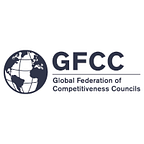Highlights from the GFCC Innovation Arena at COP 28
The GFCC closed 2023 with a signature event in partnership with the U.S. Council on Competitiveness at COP 28 in Dubai, UAE. The pioneering Innovation Arena in the COP 28 Green Zone on December 6th convened leaders from the Global North and South from more than ten nations for a high-profile discussion focused on surfacing actionable solutions for decarbonization and forming new partnerships to build more sustainable, climate resilience and competitive economies and societies.
In preparation for the GFCC’s annual summit, the Global Innovation Summit, and COP 28, the GFCC published actionable recommendations that helped steer the Innovation Arena. These recommendations, Call to Action — Innovate the Sustainable Future, can provide an essential backdrop for the conversation that took place at the Innovation Arena.
Guiding the conversation were two overarching questions: what action, recommendation, or best practice are you advancing to promote greater innovation-based sustainability in your organization and community? What one action would you like to take coming out of COP 28, and how can the GFCC best engage our Innovation Arena community to advance that action in the year ahead?
From the discussions, nine key takeaways prevailed.
Innovation is key
Innovation is the cornerstone of sustainable progress. The consensus was clear: to address climate challenges, we must continuously create and introduce new solutions, products, technologies, and business models into the market. It’s not just about incremental improvements. True sustainability demands transformative innovation.
Diversity fuels sustainability
Diversity and plurality of solutions is an asset in addressing the climate crisis; there is no space for a one-size-fits-all solution, given the complexity of the matter. There is a need for diverse solutions, technologies, business models, policies, and actions at various levels to address climate change effectively and seize emerging opportunities. The Innovation Arena showcased an incredible diversity of ideas and participants. The wealth of insights from leaders in research universities, industry, national research organizations, and non-profits was a testament to the collective intellect and creativity needed to tackle climate issues.
Abundant business opportunities
Addressing climate change can create a variety of new business opportunities. There is a need to create new business models and foster new solutions in multiple areas, such as renewable energy and cleantech, green building, carbon capture and storage, sustainable agriculture, waste management, and others. The Innovation Arena fostered the intersection of ideas, expertise, and resources, generating an environment ripe for collaboration and investment, emphasizing that the fight against climate change is not just a responsibility but a significant economic opportunity.
Driving the energy transition
The momentum for the energy transition is palpable, with markets and innovators increasingly taking the lead. The shift towards sustainable technologies, business models, and practices is not merely a trend but a fundamental force, with markets and innovators leading the transition to cleaner, more efficient energy sources and catalyzing change in the years to come.
Role of public-private partnerships
While markets play a crucial role, the consensus underscored that markets alone cannot solve the sustainability challenge. Public-Private Partnerships (PPPs) are essential, with the GFCC consistently advocating for their pivotal role in advancing sustainability in its work over the years. Collaboration between governments, private sectors, and civil society is crucial for lasting impact. Finance has a central role, with government entities and private sector financial institutions being called to collaborate.
Financing climate solutions
Financing solutions for climate change requires a combination of public and private sector investments, innovative financial mechanisms, and collaborative efforts. Blended finance, a mix of private and public funding, emerged as a critical strategy. Governments were encouraged not to replace private sector investment but to act as catalysts, mitigating risks to entice private investors and ensure the success of sustainability projects.
Tech solutions and investment
Throughout the Innovation Arena, tech entrepreneurs, investors, and research leaders emphasized the necessity of promoting new technologies and solutions to the investment community. It is essential to give visibility to those and accelerate them into the market. The event emphasized aligning financial resources with these tech solutions to propel sustainable innovations forward.
Interest and action are gaining momentum
COP 28, characterized by its substantial size and complexity, provided a unique backdrop for the discussions. The extensive turnout at COP 28 reflected a surge in interest in climate change and sustainability, highlighting the global significance that topic is gaining across sectors. This suggests that stakeholders across sectors are finding new opportunities and that the collective efforts to address climate change can gain further momentum going forward.
The role of AI in sense-making
The massive scale of COP 28 events makes it hard for anyone to grasp what is happening at any moment. More than that, making sense of all the discussions, ideas, and initiatives being generated is virtually impossible. AI tools could and should be used to help distill, organize information, connect, analyze, and make sense of the ideas, proposals, and solutions discussed. The GFCC strongly suggests that UN organizations and other parties leverage AI’s power to advance the climate and sustainability in future editions and the work related to other complex global issues.
Building on the GFCC’s 2023 Call to Action — Innovate the Sustainable Future, the GFCC will continue to act as a leadership platform for generating insights and strategies and advancing discussions on the nexus connecting sustainability, innovation, and competitiveness.
